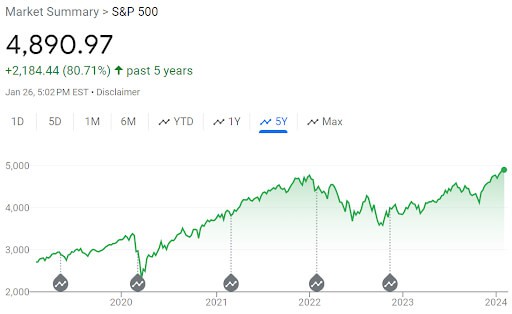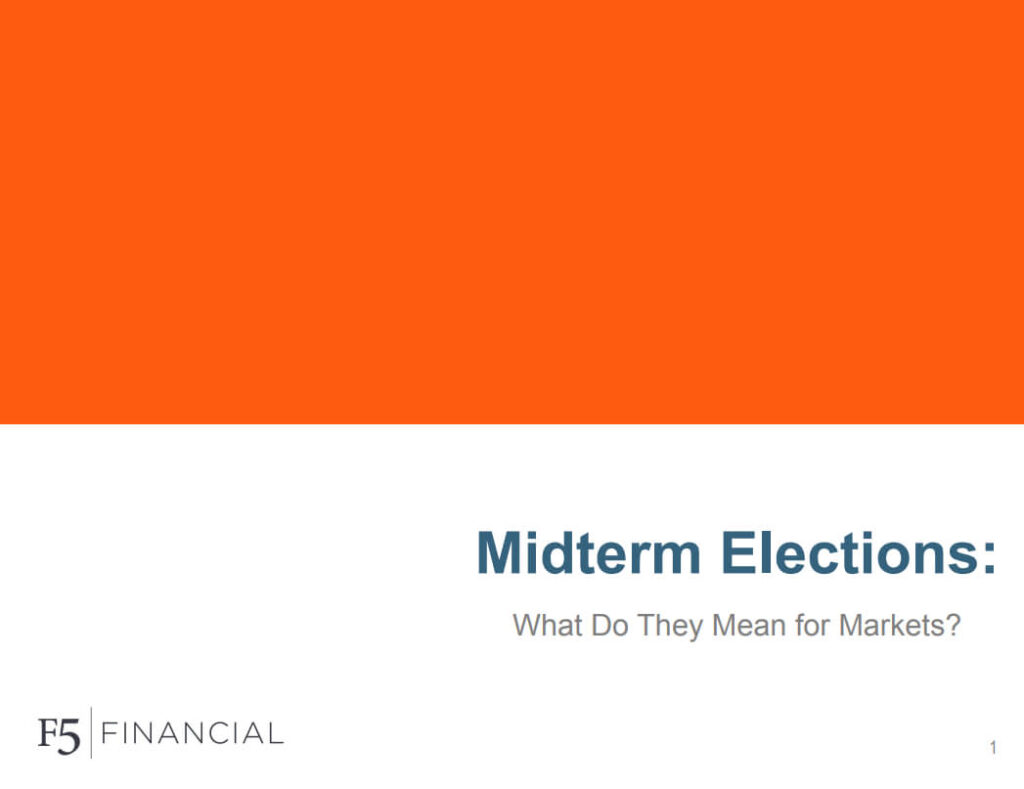
How Should I Prepare My Portfolio for the 2024 Election?

"Another year, same “you know what (ie. shXX)" - it's a sentiment that rings true as we face yet another election cycle, with its familiar uncertainties. Just as in every other year, I have clients asking the same question: How should I prepare my portfolio? Despite their urge to react, my advice remains unwavering: STAY THE COURSE. Here’s why keeping calm amidst the chaos is the smartest move in times of uncertainty.
2020 Impacted Portfolios– But Not Because of the Election.
Looking back to the 2020 election between Trump and Biden, many felt confident in predicting the winner, but the reality was far from certain. Even though people felt they knew, nobody could really know what the outcome of the election would be.
The market, however, stood ready for any possibility. The market understood that both Trump and Biden had a shot at victory and both outcomes were factored in. And since the market is smart and efficient, an event like the presidential election (something everyone knew was coming) had a small impact. Though it did lead to fluctuations, they were minor and stabilized quickly.
So what in 2020 affected the market and your portfolio?
Now, think back to 2019-2020 and this obscure, unknown thing called Covid burst onto the scene. This triggered significant economic volatility. Why? Because no one could have foreseen, not even the all-knowing market, that Covid was coming. And since nothing could predict the onset, of course, no one was going to know what would happen after.
This was an example of a black swan event– a rare and unpredictable occurrence that shocks the market and worries inexperienced investors.
Black Swan Events Will Affect Your Portfolio Performance.
To make informed decisions now, we must look at the past. Let’s consider the S&P’s events over the past 5 years.
5 Key Events
2019: S&P 500 Suffers Largest Gap Lower Since 2009 as Trade War Rages
2020: S&P Plunges 7% Triggering Market-Wide Stock Trading Halt
2021: S&P 500 set for best day in 9 months on vaccine, stimulus cheer
2022: Stock gains accelerate into the close.
2022: A better-than-expected inflation repot sends stocks surging.
In two notable years, 2019-2020, COVID-19 emerged, taking the world by storm and catching even the most knowledgeable markets off guard. In the graph above, you’ll see a tremendous dip. But if you ignore the initial turbulence, you’d see a massive decline, followed by a rapid recovery, and a market remaining relatively stable overall. Despite the uncertainties brought by the pandemic, the market showed resilience, particularly during the election year, with a steady trend upwards. Though I’m not suggesting the pandemic was a great thing, investors were pretty pleased with the market’s overall performance.
The key takeaway here is that whether it’s a presidential election or a black swan event, outcomes may not necessarily deliver what you think you're going to get. Despite initial concerns and uncertainties (and a few very stressful months), the market proved its efficiency, delivering favorable outcomes for the investors who remained patient. During the turbulent times of 2020, our advice to concerned families was simple: "Sit tight, the market is efficient, and we’ll be fine." And lo and behold, the market was efficient and we were fine.
We've witnessed others in the past, for example, the savings and loan debacle, and the internet bubble. We'll likely encounter them again in the future.
What if:
- North Korea fires off a nuclear device
- China decides to invade Taiwan
- A massive terrorist attack occurs again
*Disclaimer: These are strictly suggestions of possible events that could happen.
Though we ask “what if”, we’ll still answer the same— DO NOTHING.
What Can We Learn From the Market’s Reaction to the Election and Black Swan Events?
1. The Market is Efficient.
First, we have many cases where “knowing” is wrong. When this happens, there is almost always a downtick in the market. I believe that this is because the market is efficient and captures all available information. At the moment when new information arrives, uncertainty reigns for an instant. And, as humans, we respond negatively to this uncertainty.
However, information quickly becomes available—more so than ever in today’s connected/technology-focused world. The market then stabilizes—perhaps up, perhaps down. But information is now “out,” and efficiency returns. The lesson here is that the market is efficient.
2. Even if We Know, We Cannot Predict.
Second, we can ascertain that even when we “know,” we do NOT “know.” When Covid-19 became a thing, everyone knew a pandemic would be possible, but no one knew it would actually happen. And despite the turmoil, the market fluctuated significantly but ultimately passed through unscathed. Who could have predicted that?
3. Feelings are Real Even Though Feelings May Not Reflect Reality.
Just because I’m not worried about it, doesn’t mean I don’t feel your pain.
I’m not trying to channel my inner Bill Clinton here with “I feel your pain”, but there's a pragmatic reality to consider. When the market experiences significant drops of 10%, 15%, 20%, or even 30%, and you witness your $3 million stock portfolio diminish along with a million dollars in net worth, it's natural to feel discomfort in your stomach. But it's exactly the awareness of that unpleasantness that is so important. You want to be aware that when the market falls, you're going to feel this way. You’d be a strange individual not to.
But it’s also a strange individual that has the discipline to stay with that. And that's one of the ways we provide value is by reinforcing that this is normal. How you're feeling is normal. The job is normal. And skill-experienced investors realize that and help you avoid making the wrong decision at the wrong time.
Stay the Course Ahead of the 2024 Election.
If you look at the magnitude of change, which has occurred over the last 110 years, wars, social changes, polio going away, poverty being addressed, and global pandemics. Do you really think there's gonna be something that different driven by the next president?
With the above in mind, the “action” that you need to take with your portfolio is NO ACTION! You need to stick with your Investment Policy Strategy (IPS) and stay the course. Whether the nation goes red or blue, my two unshakable beliefs guide me to stick to my IPS through good times and bad.
Watch Out For Bad Advice.
The best advice you can take is from history itself. Midterm Elections: What Do They Mean for Markets? offers specifics about market performance related to election results. The message is that, whether the outcome is red or blue, the market marches on. Don’t be a fool and let the pundits convince you that you NEED to act. That’s bad advice and can be very costly to your investments.
In conclusion
Looking back at events such as the 2020 election and the surprise of COVID-19, we see that the market can handle chaos well. Sticking to your plan is the smart move. If you're looking to discuss the election, review your Investment Policy Statement (IPS), or gain further insight into why your portfolio is better left alone, reach out to F5 Financial.
Would You Like More Support?
- Do you have a well-defined Investment Policy Strategy that is used to drive your investments in support of a comprehensive financial plan?
- If not, would you like to partner with someone who is used to helping people get through these struggles and (then, with confidence) implement portfolio strategies in a systematic manner while focusing on your desired outcomes?
If so, feel free to send us an email or give us a call. We’d love to have the opportunity to help you find a bit more peace of mind when it comes to investing.
F5 Financial
F5 Financial is a fee-only wealth management firm with a holistic approach to financial planning, personal goals, and behavioral change. Through our F5 Process, we provide insight and tailored strategies that inspire and equip our clients to enjoy a life of significance and financial freedom.
F5 Financial provides fee-only financial planning services to Naperville, Plainfield, Bolingbrook, Aurora, Oswego, Geneva, St. Charles, Wheaton, Glen Ellyn, Lisle, Chicago and the surrounding communities; to McDonough, Henry County, Fayette County, Atlanta and the surrounding communities; to Venice, Sarasota, Fort Myers, Port Charlotte, Cape Coral, Osprey, North Port, and the surrounding communities; and nationally.
We'd love to have the opportunity to hear about your situation. Contact us here to schedule an appointment for a consultation.
Learn more about What We Do.
Helping You With
Wealth Preservation – Wealth Enhancement – Wealth Transfer – Wealth Protection – Charitable Giving


